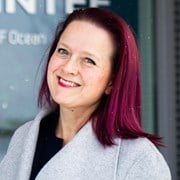GOMPLAR will assess and compare the governance mechanisms of the Northeast Atlantic and the Northwest Pacific Oceans, to identify the constituent elements of a legal and political platform for the prevention and remediation of marine plastic litter discharge that can be applied in the Arctic. The research aims at generating new knowledge to support future policy formulation by the government of Norway, the Arctic Council and other bodies currently working to put in place a circumpolar regulatory framework to minimize marine plastic litter in the Arctic.
In 2015, the United Nations General Assembly (UNGA) adopted the 17 Sustainable Development Goals (SDG) in the Agenda 2030 for Sustainable Development. SDG 14 relates to conservation and use of oceans, seas and marine resources for sustainable development. Estimates suggest that more than 150 million tons of plastic are accumulated in all oceans (UNEP and GRIDArendal, 2016), with negative impacts on marine life, including fish, birdlife, mammals, invertebrates and plankton (Beaumont et al., 2019).
With five years to go to reach SDG target 14.1, emphasis on effective and coordinated governance schemes must be front and center. GOMPLAR addresses the need for comprehensive, international regulatory
mechanisms to prevent and remediate marine plastic pollution in the Arctic. The regulatory framework for the Arctic is incomplete and concerted international efforts are required. By assessing and comparing the regulatory frameworks pertaining to marine plastic litter in the Northeast Atlantic and the Northwest Pacific Oceans, GOMPLAR aims to identify their current shortcomings, and equally important, best practices, to improve the legal and political framework addressing plastic litter in the Arctic. In GOMPLAR, we will analyze how implementation of circular economy can be driven by international agreements.

Secondary objectives:
- O1: Identify key governance and effectiveness challenges and gaps that will provide an understanding of where more research or political willingness is needed to effectively solve marine plastic litter problems;
- O2: Assess the role of the Arctic Council as a potential platform (or an orchestrator) for connecting different sub-Arctic efforts, given that UNEP (overlooking NOWPAP), OSPAR Commission and relevant environmental NGOs such as WWF, CCU, are observers at the Arctic Council;
- O3: Develop new knowledge to support future policy formulation by the government of Norway, the Arctic Council and other bodies currently working to put in place an international framework to mitigate marine plastic litter in the Arctic;
- O4: Inform decision making towards measures that minimize negative plastic impacts in the Arctic; and
- O5: Engage with a range of current international initiatives to arrest the proliferation of plastic pollution at sea, promoted by governments and civil society across the globe.

